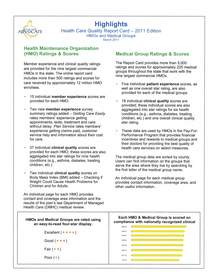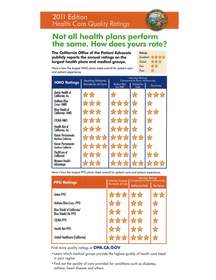SACRAMENTO, CA--(Marketwire - March 10, 2011) - At a time of high health care costs, it is critical to examine what California consumers are getting from their health care dollars in terms of quality. According to the 2011 Health Care Quality Report Card released today by the California Office of the Patient Advocate, the quality findings indicate that:
- The overall clinical performance ratings of the state's largest Health Maintenance Organizations (HMOs) compare well to health plans nationwide, with all but one plan performing above the mid-point nationally.
- The member experience ratings for four HMOs declined, while the ratings of another two HMOs improved.
- A new member experience rating highlights that members are reporting increased confusion about the costs of their care and paying claims. One-third of members reported they were not able to get information from their HMO on how much they would pay for a service or medication.
The Report Card rates the state's nine largest HMOs, six largest Preferred Provider Organizations (PPOs) and more than 225 medical groups on meeting national standards of care and member experience ratings compared to plans nationally.
"Not all health plans provide the same quality of care on different measures," said Office of the Patient Advocate Director Sandra Perez. "It's imperative that health care consumers know that quality matters and -- as the Report Card clearly shows -- quality varies. As the Patient Advocate, I'm concerned about how this performance data translates into the care that impacts the lives of millions of Californians of all ages. Publicly reporting these ratings incentivizes the health care industry to improve the care provided to their members."
For the past 10 years, the Office of the Patient Advocate has annually produced the state's Health Care Quality Report Card that provides health plan performance results on a set of core measures and adds new measures to address emerging areas of concern. The Report Card identifies areas in need of improvement. As an example, in early editions of the Report Card, the HMO clinical performance on administrating asthma medication was alarmingly low. This year's Report Card shows that the performance of all HMOs prescribing the right asthma medications to control asthma in children, adolescents and adults ranges from 90 to 98 percent. Similarly, the Report Card findings indicate that the California health plans do well in testing levels of blood sugar and cholesterol among patients with diabetes, but clearly point out that much more needs to be done to help the patients control their blood sugar and cholesterol as means to prevent serious complications.
The 2011 edition of the Report Card includes an important new performance measure that puts the spotlight on another area needing improvement -- checking children and adults at risk for obesity and weight-related health problems. The Report Card data show:
- Most children (62 percent) and almost half of adults (45 percent) have not had their body mass index (BMI) checked when visiting the doctor -- a simple way to gauge if a person's weight may lead to serious health problems.
- All but one of the largest California HMOs -- Kaiser Permanente Southern California -- failed to perform at or above the national average for checking BMI in children.
This latest edition of the Report Card also features new data on member experience in receiving specific services provided by the HMOs. When compared to health plans nationwide, the data indicate that:
- California's nine largest HMOs rated either Fair or Poor for the new member experience measurement of Getting Care Easily. This measurement reflects members' experience in getting appointments, tests, treatment and care without delay.
- The majority of the nine HMOs received Poor ratings in the other new member experience measurement of Plan Service. This measurement reflects members' experience getting claims paid, customer service help and information about their cost for care.
In addition to health plan findings, the Report Card provides performance ratings on the largest 225 medical groups in the state:
- Twenty-six medical groups received an Excellent rating for clinical performance (meeting national standards of care) and 27 received a rating of Excellent for patient experience.
- Medical groups showed a greater variation than HMOs in both their overall clinical ratings and condition-specific ratings (range of 16 percent to 92 percent).
"This 10th edition of the Report Card marks a milestone for the Office of the Patient Advocate and its longstanding commitment to provide transparent, easily accessible data on the performance of health plans and medical groups so that all Californians have the information needed to get the right care for themselves and their families," said Perez. "In the years to come, as more Californians prepare to purchase health insurance, the quality of care data will be an essential element of informed decision making at multiple levels of the health care system -- patient, provider, plan, policy makers and purchasers."
The California Office of the Patient Advocate was established in 2000 to represent the interests of health plan enrollees in California by educating them on their patient rights and responsibilities and publicly reporting on health care quality. For more detailed information about the 2011 Health Care Quality Report Card, visit opa.ca.gov. The OPA website provides a one-stop-shop on health care quality reports covering health plans, Medi-Cal, Healthy Families, hospitals, and long term care facilities. Copies of the Report Card can also be obtained by calling 1(888) 466-2219. In addition, other resources to help consumers get the most out of their health care can be found on the website.

